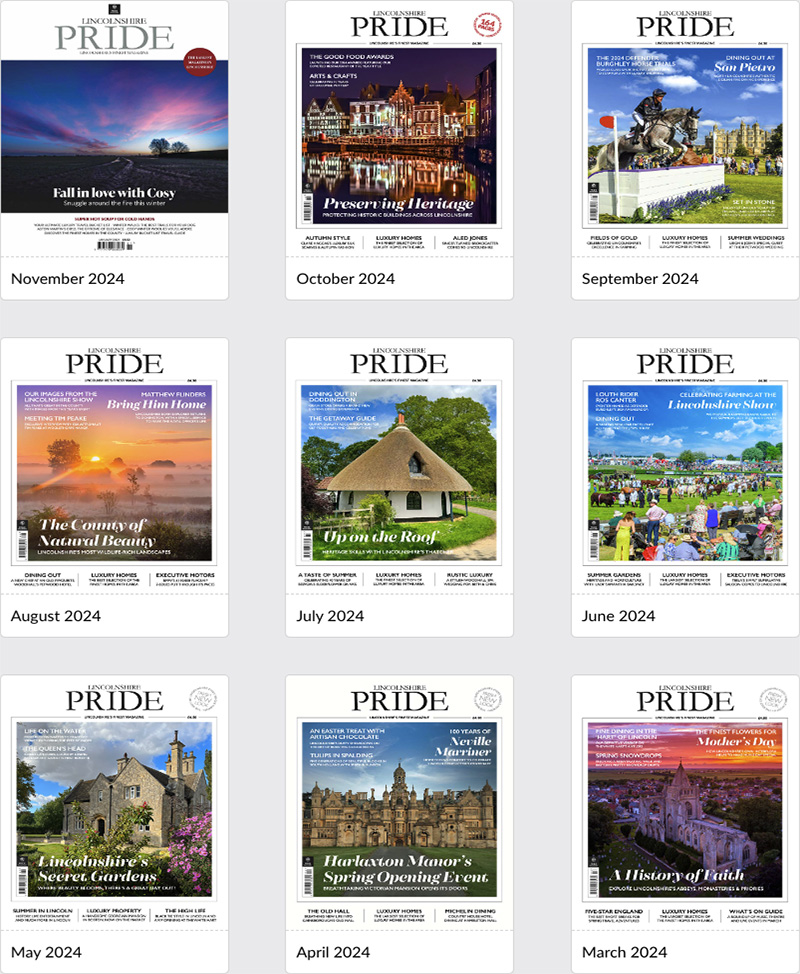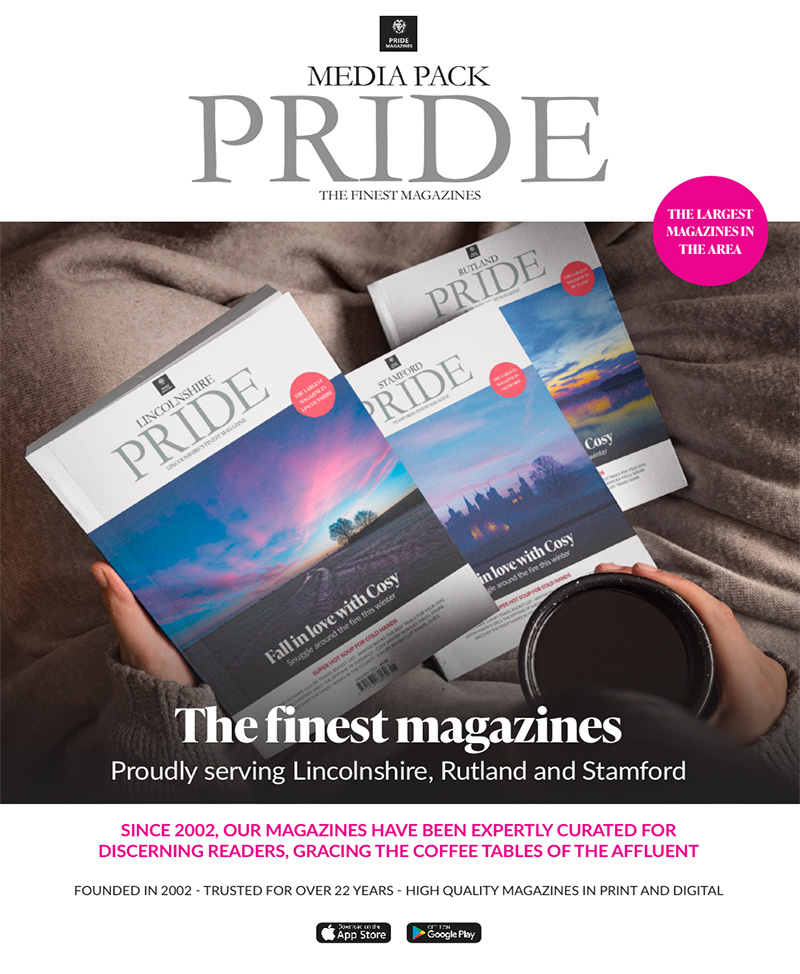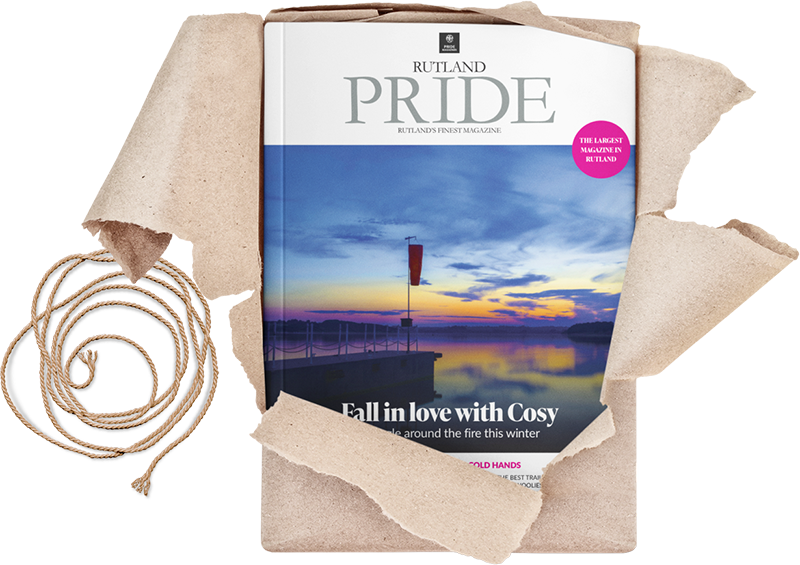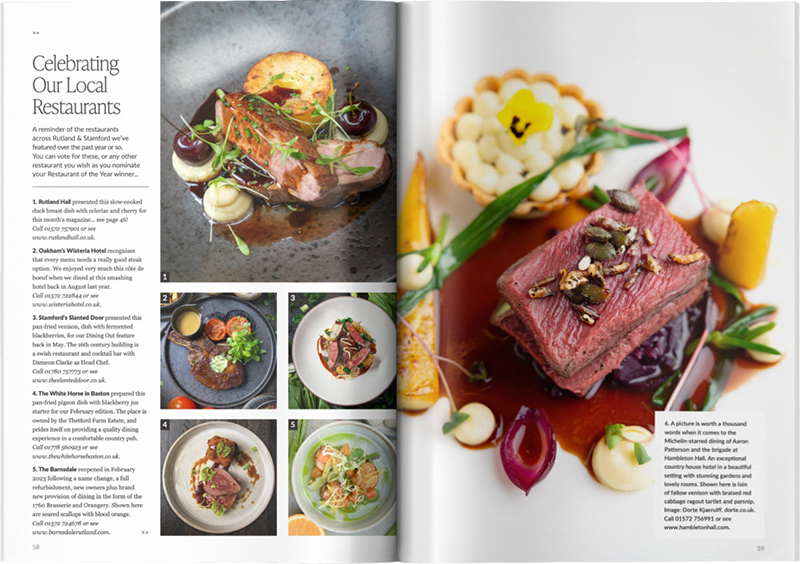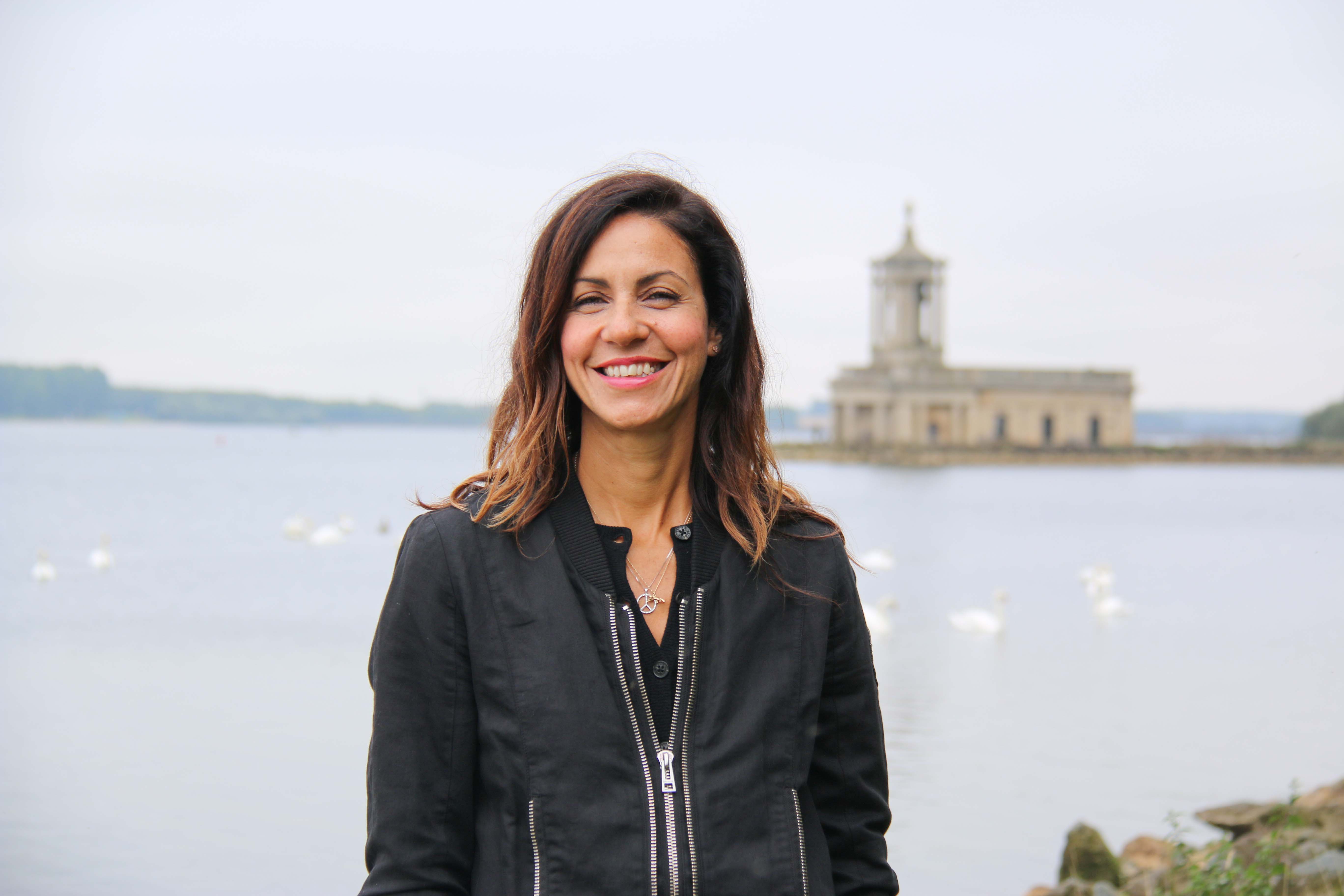
A Flask of Tea with Julia Bradbury
Rutland’s Julia Bradbury has always enjoyed a special relationship with the great outdoors, but since a breast cancer diagnosis in 2021, she also credits it with helping her to fight the disease. Now with her brand new book, Walk Yourself Happy, she wants us all to enjoy a healthier and more active life, beginning in January 2024!
Hurried, harried, hyperconnected and heartsore. Sometimes even helpless. January can feel like a fairly flat month in terms of our mood and so this month, more than ever, it’s important to take care of ourselves and nurture a strength of spirit that ensures we embrace the new year in a physically, but also mentally, sound condition.
As far back as the fourth century the theologian and philosopher St Augustine was advocating spending time outdoors walking declaring ‘solvitur ambulando,’ literally ‘it is solved by walking.’
His words have been echoed by countless others from fitness advocates, to naturalists such as Darwin and other contemporary philosophers like Nietsche. More recently they’ve also been echoed by Rutland’s own Julia Bradbury, who grew up here and retains family connections to England’s smallest county, having fond memories of walking around the local countryside as a youngster with her father Michael.
Julia’s family life – she’s a mum to three children – and her career in broadcasting have always seen her remaining busy, but in 2021 her established priorities were brought to a screaming halt with a diagnosis of breast cancer which saw her re-evaluate her life, with physical health and mental wellness taking priority.
“I wanted to explore how seemingly small additions and new habits can have a profound on your physical health and your wellbeing,” says Julia. “I’m not an academic or a doctor – aside from an honorary doctorate – and I’m definitely not a scientist, but I do talk to such people in my new book all about the journey.”
“What I do have are lived experiences, especially of walking being curative. I’ve used walking to help me through breast cancer, but other traumas too, from IVF and miscarriage to grief, mental health issues and even a broken heart.”
“Walking in Rutland with my family is a joy, but I’ve also been lucky during a career in broadcasting to have experienced trekking along the seaboard of the Indonesian Archipelago, through the rainforests of Australia and across the Mongolian deserts, as well as walking across a lot of the Greek island digging into my Mama Mou Chrissi’s family history.”
“All of those landscapes were wildly different, but what they had in common was their ability to be a backdrop for walking experiences which heal the body, calm the mind and lift the heart.”
“You don’t need big landscapes or seat-of-the-pants travel adventures to benefit from such ‘green therapy’ though (I call it getting a dose of Vitamin N, for nature). Even walking in England’s smallest county can help you to walk yourself happy and healthy, hence the book’s title.”
Having re-evaluated everything from her diet to her breathing, Julia’s combination of an interest in health, research and the fact that walking gives her pleasure to live better have all culminated in her latest book, Walk Yourself Happy.
From the title you might be mistaken that it’s simply a book of walking routes or one which just advocates exercise, but the book goes much further in its remit, encouraging consideration of diet, sleep, exercise and even breathing.
Julia and Rutland
From her roots in Rutland, Julia worked alongside sister Gina and her mother in a fashion business owned by the latter, before working for the London-based advertising agency Jaffe & Young.
The broadcasting landscape changed in the mid-1990s with the launch of new cable and satellite channels courtesy of enfants terrible of broadcasting from Kelvin MacKenzie who would go onto edit The Sun and Janet Street Porter, who helped to launch L!ve TV. Julia worked for Janet on the station as a presenter alongside Claudia Winkleman before joining GMTV as its celebrity correspondent based in Los Angeles.
From there, she presented the BBC consumer rights programme Watchdog and later other factual programming from Countryfile to many walking series from Railway Walks to Canal Walks, and ultimately Unforgettable Walks, plus a reboot of Wainright Walks, following in the footsteps of Alfred Wainright, retracing his favourite routes in the fells.
Julia and walking
“The thing about walking is that you don’t need incredible landscapes, fancy kit, a team leader or physical fitness and talent. To get started you just lace up your shoes and put one foot in front of the other.”
“I was recently involved with the mental health charity Mind, challenged to encourage a group to pull on their wet weather gear and enjoy getting out in the darker winter months. Some people think that it’s better to walk in spring and summer. Not me. I love a winter walk on a crisp chilly day, and I enjoy the freshness of the air when it’s a bit soggy.”
“To be outside is to feel and experience life in the round. Being outside also means being around nature. When I’m sharing space with a tree breathing in cold, cloudy air or staring at the fractal patterns of a pine cone I feel happy and in awe of the magic of nature, I feel content with my place in the world.”
“I’ve always exercised but recovering from cancer has taught me that to keep our body systems working well, I need to commit to an hour of exercise at least four times a week.”
“That might sound daunting, but one in six deaths in the UK is caused by inactivity… physical activity won’t kill you, but inactivity can. That’s not to say that you have to exercise for a prescribed amount of time.” “Even getting outside for a shuffle around the garden is beneficial, and if all you can manage is ten minutes a few times a week then I encourage you to do just that.”
“If you’re physically more active, your heart is conditioned to beat slower and stronger, and it needs less oxygen to function well. Your arteries become springier, so they push your blood along more efficiently, and your levels of ‘good’ HIDL cholesterol rise.”
“Physical activity also helps prevent type two diabetes; when your muscles are used to working, they stay more receptive to insulin, the hormone that ushers blood sugar into the cells. If you’re fit, blood sugar levels aren’t as likely to creep up.”
“In older age, physical activity can delay the slide of cognitive decline into dementia and, even after the process has started, exercise, alongside exposure to light at the right time of day, can improve certain aspects of thinking.”
“Moving the body helps the brain, too. Several studies have found that exercise can reduce symptoms of depression, changing the brain in ways similar to antidepressant medication, which brings us to the subject of mindfulness and specifically breathing.”
Julia and breathing
“It’s no coincidence that much tuition of meditation, yoga or other mindfulness-related activities place a strong emphasis on breathing. You’d be forgiven for thinking that you already know how to breathe. You’re doing it now, and it’s just opening your mouth and sucking in air, right?”
“Apparently not. We breathe unconsciously but often make three common mistakes. We breathe into the chest and upper body. We breathe through the mouth and we breathe too much.”
“Learning how to breathe is life-changing and can have a profound effect on our sense of well-being. On average we breathe in and out 25,000 times a day, but we don’t necessarily take nutritional breaths. Breathing ‘well’ means doing so through your nose, which triggers the sinuses to release nitric oxide, a molecule which plays an essential role in absorbing oxygen. We can absorb 18% more oxygen breathing nasally than we do by breathing orally.”
“In the book I cover breathing exercises, explore the fascinating differences in breathing in different cultures, and cover different breathing techniques like Ujjayi (victorious breath), Bhastrika (bellows breath) and chanting. Like proper sleep, and good nutrition, breathing is one of the pillars of a healthy life and it’s free at the point of use, so it’s remarkable that few of us know how to get the best out of it.”
Julia and diet
“Until a couple of years ago, I didn’t give much thought to what I ate, nor how I ate it. I’ve always been conscious of food quality but I didn’t plan my meals or calculate how much protein I was eating or count my veggies.”
“Especially when working outdoor or on travel shows for TV, my diet was a bacon sandwich – breakfast on the go – milk chocolate and millionaire’s shortbread. Sometimes we’d be on location for 18 days straight, and that’s what I’d eat for 18 days straight. Then in the evening at the end of filming the whole crew would descend on some lovely country pub and tuck into homemade pie, chunky chips or a big old steak followed by chocolate brownies or ice cream.”
“When I look at that list now I shudder. Fried foods carry heart risks, in part because they provoke inflammation and they’re often high in sodium as well as harmful saturated fats. The oil in which foods are fried commercially is often heated again and again. This can generate a variety of compounds, many of which have been reported as carcinogenic.”
“Those sausages and pies are often made with processed meat, and all red meat contains a pigment called haems, which is broken down in the gut to form compounds (called N-nitroso compounds or NOCs), which are also known to cause cancer.”
“Then there’s all the sugar. Sugar comes in many forms, and is hidden in foods that you wouldn’t expect. It’s not just in sweets, cakes and biscuits, but things like sauces, soups, fruit juices and meat products.”
“The average American now consumes approximately 126g of sugar a day. That is about ten tablespoons, and we’re not far behind. There’s a huge body of evidence about the damage too much sugar does to cardio-metabolic health and I certainly ate more than the recommended daily allowance of 24-30g sugar daily.”
“I stopped and switched to dark chocolate – over 70% cocoa solids – which was just one part of a huge overhaul of my diet that I undertook after my cancer diagnosis and mastectomy; quitting sugar saw me losing a lot of weight, very quickly.”
“That’s not to say that chips are off the menu completely, but I do advocate the 80/20 rule whereby for 80% of the time I eat healthy, whole foods and for the other 20% of the time, I treat myself or at least accept that I’m doing the best in a world of processed foods and with a busy lifestyle.”
“We also can’t consider nutrition without talking about hydration. Estimates vary from six to eight glasses of day being recommended, and it is also possible to overhydrate, but usually we drink too little, which can reduce our cognitive performance, including memory, focus and creative thinking. Without proper hydration, your blood becomes viscous and harder to pump, and without proper hydration, none of the cells in your body can function.”
“There’s an emerging awareness, too, of the danger of too many ultra-processed foods in our diet. These are replete with nasty chemicals that our microbes react badly to; processed foods deprive them of fibre and instead bombard them with artificial substances like sweeteners and emulsifiers designed to enhance texture and extend the shelf life of foods.”
“In the book I speak to Professor Tim Spector OBE of King’s College. Whilst he’s no killjoy, he’s acutely aware that 57% of an adult’s diet and 70% of a child’s diet in Britain today is now made up of processed food. Globally, poor nutrition still accounts for 11 million deaths every year and adds more to the burden of ill health than drugs, alcohol and tobacco combined.”
The consumption of vegetables, legumes, fish, nuts, seeds and fruits is way below the level recommended by the World Health Organisation, and we are eating too much fat, processed meat, salt and sugar. But given the amount of processed food on our supermarket shelves, this isn’t entirely our fault.”
“Tim also says that we have to stop judging food by calories. ‘They’re nonsense,’ he says. ‘As a way of teaching people how to eat more healthily, they should be scrapped.’ It’s not about calories. It’s not about fats and carbs and protein, either. It’s about food quality. Each time you eat, if you’re mindful of nourishing your gut microbes, supporting a healthy gut microbiome and eat a diet rich in fibre to keep your bacteria in balance, you can’t go far wrong.”
Julia and sleep
“The ancient Greeks were great believers in sleep. Hypnos, the god of sleep was seen as the remover of pain, suffering and sorrow and the Greeks were confident that what sleep does for the body, dreams do for the mind, enabling it to rest and rejuvenate.”
“It’s a philosophy reiterated in an old Irish proverb – I was born in Dublin so I feel qualified to use it – that ‘a good lunch and a long sleep are the best cure in a doctor’s book.’”
“Sleep has been researched and the science of sleep advanced enormously in the past two decades, and achieving good sleep hygiene by means of things like an evening stroll before settling in, cooler bedrooms, the avoidance of caffeine and avoiding pre-bedtime snacks as well as avoiding tech-induced anxiety by having a phone on your bedside table will all help to improve the quality of your sleep.”
“Based on a control group of over 6,000 cases in five different countries, the International Agency on Cancer in Lyon also concluded that disrupted sleep patterns are ‘probably carcinogenic to humans,’ which is quite a terrifying prospect given the lack of consideration we give to the quality of our sleep.”
Julia and the future
“Cancer saved my life, which may seem like a strange thing to say, but it opened my eyes to what I was doing to myself, pushing myself emotionally and physically to reach impossible goals. Re-examining my relationship with nutrition, sleep, exercise and breathwork was, I now realise, so important.”
“After my documentary Julia Bradbury: Breast Cancer & Me aired, many people have approached me when they’ve seen me out and about or they’ve messaged me to ask if I was OK. They’ve all offered well-meaning thoughts with one of the most common being ‘thank you for sharing your story, very brave,’ but honestly, I’m not brave.”
“I think cancer saved my life. I got it and I had to make changes. The book explains how I did it, and I hope it might help others too. Fundamentally, I wrote it because I believe we can all walk ourselves happy, taking small steps and then big strides, through the glad days of our lives.”
Walk Yourself Happy by Julia Bradbury is published by Piatkus, an imprint of Hachette and Little Brown. Available from all good local bookshops, personalised copy is available directly from Julia’s website, The Outdoor Guide, £25 www.theoutdoorguide.co.uk. The website also has a range of Julia’s favourite walks by region and theme.



